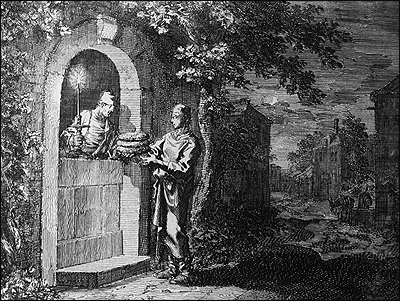
Home > Jesus > Parables of Jesus > The Friend at Midnight
 The Friend at Midnight
The Friend at Midnight
Then He said to them, “Suppose one of you has a friend, and goes to him at midnight and says to him, ‘Friend, lend me three loaves; 6 for a friend of mine has come to me from a journey, and I have nothing to set before him’; 7 and from inside he answers and says, ‘Do not bother me; the door has already been shut and my children and I are in bed; I cannot get up and give you anything.’ 8 I tell you, even though he will not get up and give him anything because he is his friend, yet because of his persistence he will get up and give him as much as he needs. — Luke 11:5-8, NASB
The importance of being diligent in prayer is the message of this parable, appearing in Luke’s gospel just after Jesus had instructed the disciples how to pray. The idea would also be emphasized in the parable of the persistent widow.
Hospitality was an extremely big deal in Middle Eastern culture in biblical times. There was certainly no abundance of inns or hotels as exists today, and it was often necessary for people to open their homes to traveling friends and relatives. Consequently, being unprepared for a guest—even if the visit was unexpected—was a gross oversight, one that might compel a host caught flatfooted to beat on his neighbor’s door in the middle of the night for provisions.
The neighbor in this case doesn’t necessarily respond out of friendship—he does it because the guy just won’t quit banging on the door. The point is of the parable is simple: if this exasperated neighbor is willing to get up and provide what’s being asked for at such an inconvenient moment, how much more will our Father in heaven, who loves us perfectly and without end, satisfy our needs?
Jesus goes on in the verses that follow to illustrate exactly that; that we should be assured in prayer that God will provide for us. If we, "being evil," know how to provide to our dependents appropriately, certainly a holy and merciful God does.
The parable instructs us to be just as tenacious when we pray as the importunate soul beating on the door in the middle of the night. Certainly it doesn’t mean that it’s okay to be superfluous or reckless and impulsive in prayer, but the point is made clear that we should keep at it, with full confidence that God will grant us what we need according to his will.
God hears every prayer, but we all know that every prayer is not answered instantly, as we would maybe have it, on the first request or even the first few hundred. We also need to take our prayers seriously and make sure what we’re asking for is not petty or to satisfy a whim, but a legitimate need such as the bread in this parable.
When we pray, we must remember that God’s will and timing is perfect, and that the act of prayer is meant to be an ongoing communication with Him, not just a supernatural 911 call when we happen to be in a bind. It is not just about our petitions. Of course, if it is His will, God can solve people’s sudden crises instantly—it’s happening somewhere at this very moment—but the lesson being taught by this story is that it is important to maintain a continuous dialogue with the Almighty through prayer. By knocking on His door we develop our relationship with Him; to commune with God is to have security and confidence that He will meet our essential needs and lead us in the plan He has for us.
Image:
Luyken, Jan (1649-1712); Ask and Ye Shall Receive; Medhurst, Phillip (attribution)
Scripture Alone • Faith Alone • Grace Alone • Christ Alone • To the Glory of God Alone
Most scripture quotations taken from the New American Standard Bible® (NASB)